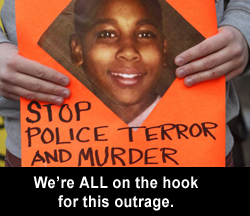By another name.
Cleveland's police department has been issued a lengthy set of restrictions by the Justice Department in response to a pattern of systemic abuses and unconstitutional practices, according to the 110-page DOJ report. We know about some of the most egregious recent racially charged cases, such as the massive police chase after and killing of a black couple whose car backfired (which recently ended in acquittal of one officer), the killing of Tanisha Anderson, as well as the Tamir Rice case - one of the most heinous examples of police brutality in recent memory. Cleveland's mayor has signed on to sweeping changes for the department, which may be a step in the right direction.
 This is, however, an issue that isn't going to be solved through police reform. Yes, dialing back police tactics is a necessary component, but it is just one element in a far more complex picture. Black Americans have been treated like shit since emancipation (prior to that as well, of course). Black life has been criminalized nine ways from Friday, starting with the virtual enslavement of African Americans in the post-reconstruction era (as chronicled by Douglas Blackmon in Slavery By Another Name) through their continuing persecution in the modern era (see Michelle Alexander's The New Jim Crow). Couple that with the kinds of exclusionary practices in housing policy and employment that Richard Rothstein at the Economic Policy Institute writes about, and you will get a sense of how we've gotten to this place.
This is, however, an issue that isn't going to be solved through police reform. Yes, dialing back police tactics is a necessary component, but it is just one element in a far more complex picture. Black Americans have been treated like shit since emancipation (prior to that as well, of course). Black life has been criminalized nine ways from Friday, starting with the virtual enslavement of African Americans in the post-reconstruction era (as chronicled by Douglas Blackmon in Slavery By Another Name) through their continuing persecution in the modern era (see Michelle Alexander's The New Jim Crow). Couple that with the kinds of exclusionary practices in housing policy and employment that Richard Rothstein at the Economic Policy Institute writes about, and you will get a sense of how we've gotten to this place.
We need to face the fact that we have a deeply racist history as a nation - one that far outlasted slavery. It is a central theme of the American story, pervading every aspect of Black life, from the homes they live in to the jobs they are able to get to their ability to stay on the right side of the law. After decades and decades of regressive policies that restricted black families to some of the poorest areas in the country, kept them from prosperity, and subjected them to aggressive policing, we need to do more than tinker around the edges.
This is the civil rights challenge of our time. Confining reform to police departments is like blaming teachers for disadvantaged young people's inability to succeed in school. We need to make bolder moves, and we need to start now.
luv u,
jp
 This is, however, an issue that isn't going to be solved through police reform. Yes, dialing back police tactics is a necessary component, but it is just one element in a far more complex picture. Black Americans have been treated like shit since emancipation (prior to that as well, of course). Black life has been criminalized nine ways from Friday, starting with the virtual enslavement of African Americans in the post-reconstruction era (as chronicled by Douglas Blackmon in Slavery By Another Name) through their continuing persecution in the modern era (see Michelle Alexander's The New Jim Crow). Couple that with the kinds of exclusionary practices in housing policy and employment that Richard Rothstein at the Economic Policy Institute writes about, and you will get a sense of how we've gotten to this place.
This is, however, an issue that isn't going to be solved through police reform. Yes, dialing back police tactics is a necessary component, but it is just one element in a far more complex picture. Black Americans have been treated like shit since emancipation (prior to that as well, of course). Black life has been criminalized nine ways from Friday, starting with the virtual enslavement of African Americans in the post-reconstruction era (as chronicled by Douglas Blackmon in Slavery By Another Name) through their continuing persecution in the modern era (see Michelle Alexander's The New Jim Crow). Couple that with the kinds of exclusionary practices in housing policy and employment that Richard Rothstein at the Economic Policy Institute writes about, and you will get a sense of how we've gotten to this place.
We need to face the fact that we have a deeply racist history as a nation - one that far outlasted slavery. It is a central theme of the American story, pervading every aspect of Black life, from the homes they live in to the jobs they are able to get to their ability to stay on the right side of the law. After decades and decades of regressive policies that restricted black families to some of the poorest areas in the country, kept them from prosperity, and subjected them to aggressive policing, we need to do more than tinker around the edges.
This is the civil rights challenge of our time. Confining reform to police departments is like blaming teachers for disadvantaged young people's inability to succeed in school. We need to make bolder moves, and we need to start now.
luv u,
jp
Comments